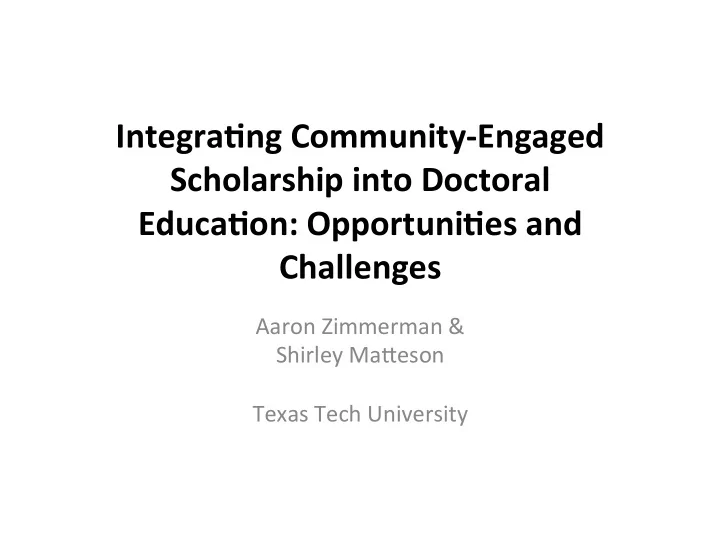

Integra(ng Community-Engaged Scholarship into Doctoral Educa(on: Opportuni(es and Challenges Aaron Zimmerman & Shirley Ma1eson Texas Tech University
Objec<ves of this Presenta<on • This presenta<on will describe opportuni<es and challenges related to integra<ng community-engaged scholarship into doctoral student educa<on. • We will present the learning objec<ves and assignments from our syllabus, as well as the ra<onale behind the assignments.
Student Learning Outcomes for the Course • Our students have not received consistent messages throughout their coursework about what community-engaged scholarship is and why it is important. • Thus, we want students to be able to understand for themselves and to be able to ar0culate to others what community-engaged scholarship is and why it is important.
Student Learning Outcomes for the Course • We want students to appreciate the importance of process over product. • This includes apprecia<ng the cri<cal importance of the nego0a0on process, and also, • The importance of reflec0ng on the process throughout the project. • (It should be noted that previous CES a1empts in our college emphasized product over process ).
Student Learning Outcomes for the Course • We want the students to be able to communicate to mul<ple stakeholders (not just an academic audience).
ASSIGNMENTS
Reflexive Journal Ra<onale: • To cul<vate a1en<on to process • To cul<vate a disposi<on to be flexible as the project evolves
Securing a Partner and Scope of Work Ra<onale: • Do our students have a deep enough background about their partner? • Do our students know about the partner’s interests and values? • Have our students talked with individuals, and not just with the people who will help them run the project, but with other people who will be involved in the project, all of the stakeholders?
Securing a Partner and Scope of Work Ra<onale: • This assignment asks students to start to build a rela<onship with the stakeholders; a rela<onship with constant communica<on to build trust • The emphasis is not just about gaining consent but emphasizes the process of nego<a<ng the aims, scope, and format of the project.
Understanding the Problem More Deeply Ra<onale: • We want students to develop the disposi<on of wan<ng to understand the problem (and the community) more deeply before taking ac<on. • We want them to appreciate the need to understand the history of the community and the concerns of the community.
Literature Synthesis of CES Ra<onale: • We want students to understand and to be able to ar<culate what community-engaged scholarship is and why it is important (as well as how CES is recognized as a legi<mate field of scholarship within the academy) • We also want students to prac<ce the academic skill of synthesizing literature systema<cally (a skill they will need as they move forward in their independent scholarship)
Dissemina<ng the Findings in Three Ways A. Report back to the community partner B. Oral presenta0on to peers & instructor C. Academic presenta0on to a community of scholars – For this component you have a choice of either:
Dissemina<ng the Findings in Three Ways Ra<onale: • We want students to iden<fy the most relevant components of the projects depending on the audience – What ma1ers to an audience of academics might not be the same as what ma1ers to the stakeholders • We also want the students to reflect on the process of presen<ng to the stakeholders – What was it like to prepare this presenta<on? – What were the future steps that were nego<ated as a result of this presenta<on?
LESSONS LEARNED AFTER TEACHING THE COURSE
• Students need more scaffolding in rela<on to how to design a research study • Students need more scaffolding in rela<on to how to conduct a literature review • We need to help students recognize when there are gaps in their methodological understandings (e.g., how to conduct qualita<ve research) • We need an addi<onal assignment to help students to align the research ques<ons and the methods of their project • We cannot overlook the fundamental research design skills required in this course (in addi<on to focusing on the unique components related to engaged research)
Recommend
More recommend